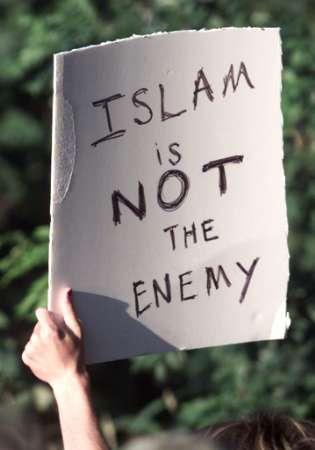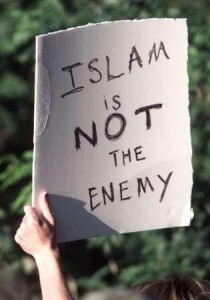One of the great things about going to college, other than a never-ending supply of free alcohol and magically delicious women, is the cool reading lists that introduce us to new and interesting ideas—ideas, frankly, that no one would ever be interested in outside of an academic setting.
As a professor once told me about St. Augustine’s “City of God“, only about .1% of the American population has/will ever touch(ed) St. Augustine. One of these neat, little gems that not many have heard about (though I’m guessing a few more have read this author since he’s contemporary and has at least been on popular television, like The Daily Show and The Colbert Report) is Reza Aslan and his book, mostly nonfiction, called, “No god but God: The Origins, Evolution, and Future of Islam“.
It’s no secret as to what Aslan addresses when regarding the title of the book. But what he has to say about the current events in regards to what’s happening within Islam as a whole, never mind geographic locations right now, is perhaps equivalent to Salman Rushdie’s “The Satanic Verses“, a scathing indictment of the West v. East or Traditionalist v. Rationalist, argument that enlightens the view point of those who practice Islam.
Within both works, but more so Aslan’s work, the argument excludes the West, i.e. capitalist societies like America (though not exclusively America), from having as much an influence over what happens in the Middle East as we sometimes like to pretend. Rather Aslan takes the stance that what’s happening over in the Middle East, especially between the Sunni and Shi’ites, is analogous, but not exact, as to what happened almost 300 years ago over in the West—an era that unquestionably resulted in Modernity as we know it today—which of course was The Enlightenment.
As most people know from their high school history classes (and those who, like me, can’t remember that far back and have to refer to Wikipedia), The Enlightenment’s main tenets centered around reason, rationalism, logic, or any other synonym that you can think of that I’ve forgot, ideals that have been lacking in current events. Thus what Aslan inevitably arrives at, and what I tend to agree with, is that the influence of the West in the Middle East invariably will have little to no effect in the long term, and it is ultimately an internal struggle that has absolutely nothing to do with us, i.e. America/West.
It’s impossible to ignore what’s happening not only within the Middle East, as a general location on the map, but within the faith and people of Muslims here in America, Britain, India, and all over. For one, it’s projected that within 50 years that they’ll take the number one spot as the largest religion within the world, a spot that is currently being held, unsurprisingly, by Christianity. This will mean that Islam will have an overarching effect on the global society—at least a larger one than they presently have. Secondly, they are not as uniform as misperceptions and stereotypes like to dictate. Like Protestantism v. Catholicism, or even Protestantism v. Protestantism, Hasidism v. Secular Judaism, the Muslim community is quite diverse, more so than just Sunni v. Shi’tes, for even those two sects have sects within sects than splinter off into many ripples. To be perfectly honest, it’s quite a big mess, more so than Baptism’s beef with Methodists about baptismal regeneration.
These misguided perceptions, leading into the 10th anniversary of the 9/11 attacks, are further amplified by hateful propaganda of Rev. Terry Jones, anti-mosque protestors, and a general air of ignorance about what the 9/11 attacks actually meant. First, as Aslan points out, there is a difference between religion and faith, and scripture and God. These attacks were carried out by a bunch of Wahhabi Sunnis that do not faithfully represent any sort of large majority of the Muslim world. Their faith, i.e. the Wahhabis, is not the same as the faith of other Muslims, their scripture, or their bastardization of scripture, is not how the rest of the Muslim community interprets religious texts.
The Qur’an is not Islam’s only text. They actually have a very rich history of literature. But what’s become most important as we head into this new decade is not the conflict between the West and Middle East, but the internal conflict happening within Islam as a whole. In fact, the long term effects of 9/11 will probably have little to do with America, but will rather reshape and redefine what it means to be a Muslim within the 21st-century, a continuing question that spans all the way back to Muhammad’s time.
A small portion of the population (of the West, at least) actually even knows why Muhammad started Islam in the first place. It had nothing so much with starting a religion, as it rarely does, and had everything to do with Muhammad’s desire to better his people’s station.
You see, there existed this superpower clan called the Quraysh that controlled the economy and defined the lives of people fourteen centuries ago in Mecca. They controlled society through these means through your basic hierarchal system, where those with all the money weren’t questioned by those who didn’t. And their main source of income, as you might be suspecting as of now, was through the Ka’ba, the “navel of the world” as they say, which was a sanctuary to all religions, and by controlling the traffic in and within the city to get to the Ka’ba the Quraysh were able to accumulate a mass of power. This easily leading to the formula, as it usually does, to the abuse of power.
That’s where Muhammad’s role comes in. Questioning the hegemony of the time, Muhammad embarks on a journey in an effort to free his people from the oppressive, economic oligarchy forming within the Quraysh. If you’d like more details into what exactly Muhammad did, then I suggest Aslan’s book. But to go through the generalities of what happened, Muhammad led what could only be accurately described as an egalitarian revolution, one equivalent, but not the same, as to what happened in the States only two centuries ago. He committed treason and broke away from the hierarchy of the Quraysh by starting a movement that would develop into a religion posthumously.
This leads into the argument that America’s brand of democracy over in the Middle East, like Iraq, is one of the most idiotic operations ever seen within our nation, similar to that of the entire Cold War. It’s a pathetic attempt to force a people into something they were leading to themselves already. And no, any efforts being put forth on our part as of right now will not succeed and are by no means effective.
The meaning of democracy is a government that best represents its people, in essence. How can another nation come in and transplant its ideals about democracy onto another and expect it to work out? What is democratic about that? It should be no secret to those reading this that our government’s motivation in the Middle East extend further than just copying-and-pasting democracy from one geographical location to the next, but is rather a means of economic control, the same the Quraysh exerted over the land so long ago.
And so, what does this mean for America and the West in relation to the Middle East and Islam as a whole? Nothing good, obviously. But what it seems to indicate is a larger schemata than originally perceived, one that involves a full withdrawal of all foreign influences that allows the Middle East and Islam to evolve, like the West was allowed to during The Enlightenment, and reconcile its beliefs with the growing trend of liberalism, logic, and reason happening throughout Islam.
And while at times it might be hard to understand that 9/11 had little to nothing to do with America, it is a realization that we must address. By no stretch of the imagination could/should the Twin Tower attacks be trivialized or demeaned, but they shouldn’t be misdiagnosed or perverted for the purpose of justifying outrageous ideological wars that, in the end, will neither further nor protect our nation.
There comes a point where, in order to fully represent our Constitution, our Bill of Rights, and our nation’s core is to recognize Islam as a fully autonomous, free will society that, as a religion, has the freedom to grow and develop in its own path and not one that is paved by anyone else.
This is not to suggest that anyone has the right to carry out any sort of terroristic actions, like 9/11, but it should not be confused as to whom conducted such an atrocious act—again, to reiterate it once more, it was a bunch of Wahhabi Sunnis who are a small minority.
Please feel free to discuss in more depth an argument you might have to add, or an opinion of how my argument lacks, because I’d love to discuss this in a larger, more specific atmosphere.
Splintering Effects,





Smike
10 Feb 2011Islam is a bad idea. It isn’t monolithicaly responsible for muslim terrorist organizations, but it still preaches things that are inaccurate, narrow minded, and authoritarian. Also, Liberalism is hegemonic and Islam is frequently positions its self to question and defy this heirarchy as well. Is this praiseworthy? I don’t think so.
I also feel the same way about Christianity.
tsudo pop
14 Feb 2011What exactly are you saying? You seem to be taking rather general text-book ideas and coming up with a parochial view of what religion actually does and accomplish. Are there some aspects of religion that are despicable? Yeah, but isn’t that characteristic of any sort of organization–be it religious, political, economical, whatever. We live in a society that’s proned to hypocrisy, corruption, and mayhem, yet somehow order, in one shape or another, comes through. “Islam is a bad idea.” What? Do you even know what Islam is? It’s definitely not an idea. That’s far too dismissive to be anything but ignorant and backwards. You need to stop projecting your own experiences with religion and just accept the fact that some people have ecclesiastical views so you won’t be so damn butthurt when some expresses a different view of life (and the afterlife) than you.
MadJiver
14 Feb 2011LOL @ ‘butthurt’ …. omg, now that’s funny.